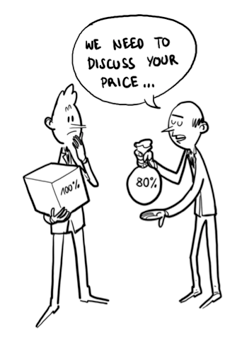 Before joining Infoteam, I was the Account Manager at a global IT service company responsible for the worldwide business with a premium German car manufacturer.
Before joining Infoteam, I was the Account Manager at a global IT service company responsible for the worldwide business with a premium German car manufacturer.
The car manufacturer had a very sophisticated IT product for providing on-line functionality to the driver e.g. hotel booking, music streaming, automatic text-message reading. They had built a team of 15 people to test innovations before they were rolled out. The contract with the current external supplier was up for renewal and procurement was open to alternatives but was pushing for the best price. That’s where we came in.
The trend towards commoditization
Professional buyers are increasingly commoditizing the procurement of services. With an increased focus on cost reduction and compliance, procurement is more and more in the driving seat – packaging initiatives with similar requirements to gain price advantages and benchmarking alternative vendors based on price. It’s not restricted to IT by the way; Lawyers and even Sales Training consultants are being seen as completely interchangeable with some customers only interested in the day rate.
A solution instead of IT testers
Let’s go back to my example. The premium German car manufacturer initially wanted to replace 15 testers with 15 testers at a lower price. We requested a workshop with the business owner of the application and the project manager. We learned that the real goal was to reduce the feedback time from the testers from 48 to 24 hours. We designed a solution that involved only 4 people on site with the customer to handle communications and a large team of testers in India. That way the test team started work just as the developers finished for the day and the developers came back in the morning and the results were waiting for them. Instead of offering a specific number of testers, we based our commercial proposal on the achievement of KPIs e.g. number of test cases performed and testing response time. So if only 90% of the targets were met the customer would only pay 90% of the fee.
We were able to pilot the solution to demonstrate to the customer just how effective it would be. So by the time the customer came to write the RFP all the requirements were about total cost and service levels rather than day rates. We were highly competitive and went on to win the business.
Challenge what the customer wants
My colleague Phil Kreindler was recently asked by a customer for a price for running a series of sales training courses. It would have been easy to just give the customer a price but that wouldn’t have got him anywhere.
Phil challenged the customer and asked ‘What it is your real goal? What do you want these workshops to achieve?’ The customer replied that sales performance had been disappointing for some years and they wanted to increase revenue by 20%. Phil suggested they get to the real root of the underperformance and proposed a design workshop. This revealed a number of weaknesses. For instance, Account Managers were required to do Account Planning but just filling in templates wasn’t leading to changes in behaviour or better results!
Phil went on to develop a sales transformation program with the customer that targeted their weaknesses and was likely to deliver against their goal. The decision to go ahead was based on perceived value - not price.
Impact on how you sell
To succeed in selling expertise as a commodity, you need good skill profiles and the best price. By elevating the level of conversation beyond procurement and focusing your solution on the real needs of the business, you can avoid the commoditization trap.
What if the RFP is already written?
In the case I mentioned earlier I was fortunate to be involved before the RFP was written so we could influence how it was going to be judged. If the RFP is written you can still ask to speak to other members of the Buying Centre and justify your approach through a case study. If you are not given access to the Buying Centre then you have to think hard about responding at all. Apply your Qualification Criteria and if the opportunity does not match up it might be better to walk away.
Questions to ask yourself
-
Do you challenge customers who ask for the wrong solution?
-
Are you submitting proposals to procurement before talking to the Buying Centre?
-
Are you wasting time on pitching for business you can never win?
Score yourself against 20 Success Factors with our B2B Selling Health Check:

